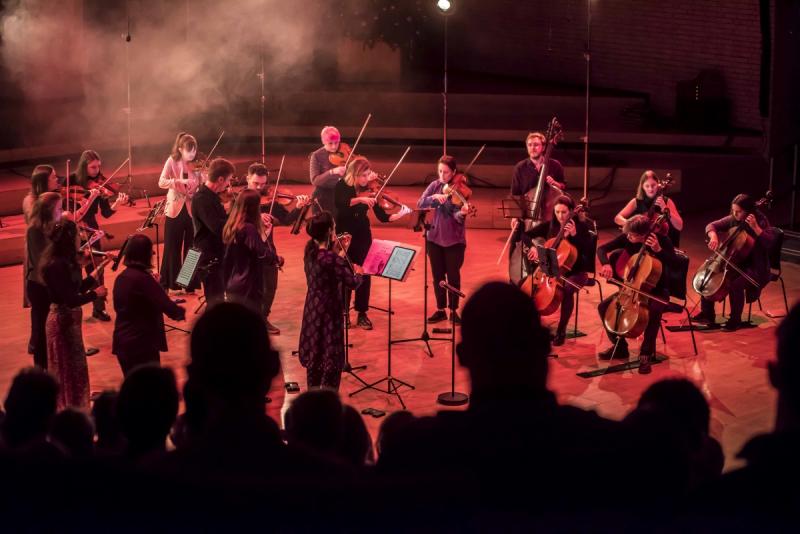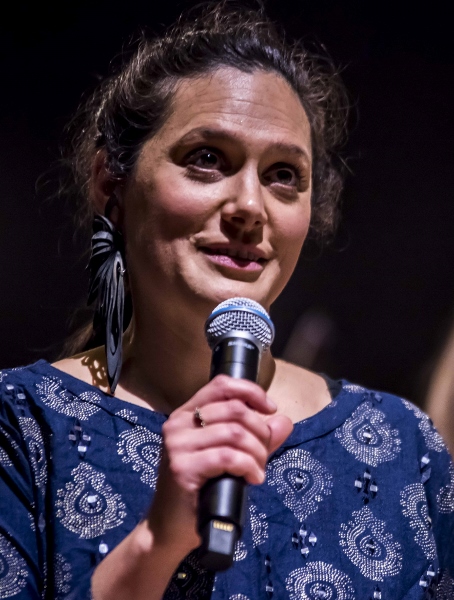Manchester Collective String Orchestra, RNCM, Manchester review - a remarkable new work for string ensemble | reviews, news & interviews
Manchester Collective String Orchestra, RNCM, Manchester review - a remarkable new work for string ensemble
Manchester Collective String Orchestra, RNCM, Manchester review - a remarkable new work for string ensemble
This themed set is an enigma, but Shostakovich puts all in perspective

Manchester Collective’s string orchestra programme, opening last night at the Royal Northern College of Music and touring to the South Bank, Leeds and Liverpool, is notable chiefly for the world premiere of will o wisp, by Oliver Leith, a remarkable piece of writing for the medium.
The set is titled “Places We Know” and was devised by Pekka Kuusisto, but he had to withdraw from performing because of illness. His place is taken by Rakhi Singh, the Collective’s music director, leading the ensemble.
The overall impression, considering that set title and the information given on the music played, is (as Elgar might have put it) of an enigma whose theme is never heard. Kuusisto is not there to explain it. Do the pieces all refer to physical places? One does: Caroline Shaw’s Plan & Elevation, which was commissioned by the US art museum, Dumbarton Oaks (known chiefly for the piece Stravinsky wrote with its name in the title).
 Another, Missy Mazzoli’s You Know Me From Here (2012), is about the feeling of place and the experience of travelling – at least metaphorically, as loss, loneliness and security are the composer’s terms to ID what it’s doing in its three named parts. It was written for the Kronos Quartet originally, and at the outset has the concerto grosso contrast of a small group with a larger one. There’s raw rhythmic energy at the start, punching its way into your consciousness (“Lift Your Fists” is the titling clue); there’s a gorgeous cello solo (Christian Elliott) in the middle bit, growing into a rich ensemble texture and a dialogue, with a role for solo viola and soaring melodic lines; and a dance-like finale of pizzicato and repeated patterns, overlaid by long sustained notes in the exhilarating way that Holst employed in the finale of the St Paul’s Suite. The playing under Rakhi Singh (pictured above) was warm and brilliant: she has a top-notch group of players for these gigs, including one of the two leaders of the BBC Philharmonic, Zoë Beyers.
Another, Missy Mazzoli’s You Know Me From Here (2012), is about the feeling of place and the experience of travelling – at least metaphorically, as loss, loneliness and security are the composer’s terms to ID what it’s doing in its three named parts. It was written for the Kronos Quartet originally, and at the outset has the concerto grosso contrast of a small group with a larger one. There’s raw rhythmic energy at the start, punching its way into your consciousness (“Lift Your Fists” is the titling clue); there’s a gorgeous cello solo (Christian Elliott) in the middle bit, growing into a rich ensemble texture and a dialogue, with a role for solo viola and soaring melodic lines; and a dance-like finale of pizzicato and repeated patterns, overlaid by long sustained notes in the exhilarating way that Holst employed in the finale of the St Paul’s Suite. The playing under Rakhi Singh (pictured above) was warm and brilliant: she has a top-notch group of players for these gigs, including one of the two leaders of the BBC Philharmonic, Zoë Beyers.
Oliver Leith’s will o wisp, a co-commission with the Norwegian Chamber Orchestra, is an intriguing work. Introducing it, Rakhi Singh said: “He does this particular thing with sound: he sort of bends it…”, and you could hear what she meant. What begins seeming almost like plainsong develops into pitch-bending, and after a fade-away there’s a slithery theme introduced in canon and built into a complex texture. Then it stops; I like Leith’s willingness to let his music speak in tranches, rather than the obsessive continuousness of works which are full of different titles but whose content seems all the same. Finger tremolandi, pianissimo tuttis, gasping fragments of melody and rich chords are all used in his lexicon, and towards the end there’s a folky kind of violin solo with a progressively weirder accompaniment and some very high harmonics, like bird calls, atop the texture – succeeded by a slow lament akin to a chaconne (remember Dido?). Leith says in the north of Europe we spend time sitting in the dark, consuming fermented stuff and playing happy/sad music, in a “warm buzz of confusion”. I get that.
Caroline Shaw, a New Yorker, is punning with Plan & Elevation (2015). Yes, they are architectural terms, and her take on Dumbarton Oaks was to look at its exterior. But she’s concerned also about life’s journey, from plans to fruitions (hopefully, elevated ones) and includes quotations from her own previous work in the five continuous sections (given titles derived from the country house’s surroundings). It's full of familiar string ensemble effects and creates a sense of the episodic rather than anything else.
The performance was topped off with Shostakovich’s Chamber Symphony (an arrangement of the eighth string quartet by Rudolf Barshai, the only one he did to have been explicitly authorised by the composer). This kind of searing introspection – it worries around his D-Es-C-H musical monogram and quotes a number of his own pain-filled creations – rather puts today’s self-referential writing in perspective. Rakhi Singh and the Manchester Collective String Orchestra ripped into its Allegro with a vehemence that was temporarily dissipated on this first night by a broken string on the principal cello (these things happen), but intensity grew once things were underway again and the remainder was played with great sensitivity and passion. There was an attempt at a bit of coloured-light enhancement of the music here (Manchester Collective like to create ambience and pumped a bit of haze around the platform all through the set, too), but it hardly needed to be added to the music.
rating
Explore topics
Share this article
The future of Arts Journalism
You can stop theartsdesk.com closing!
We urgently need financing to survive. Our fundraising drive has thus far raised £49,000 but we need to reach £100,000 or we will be forced to close. Please contribute here: https://gofund.me/c3f6033d
And if you can forward this information to anyone who might assist, we’d be grateful.

Subscribe to theartsdesk.com
Thank you for continuing to read our work on theartsdesk.com. For unlimited access to every article in its entirety, including our archive of more than 15,000 pieces, we're asking for £5 per month or £40 per year. We feel it's a very good deal, and hope you do too.
To take a subscription now simply click here.
And if you're looking for that extra gift for a friend or family member, why not treat them to a theartsdesk.com gift subscription?
more Classical music
 Jakub Hrůša and Friends in Concert, Royal Opera review - fleshcreep in two uneven halves
Bartók kept short, and a sprawling Dvořák choral ballad done as well as it could be
Jakub Hrůša and Friends in Concert, Royal Opera review - fleshcreep in two uneven halves
Bartók kept short, and a sprawling Dvořák choral ballad done as well as it could be
 Monteverdi Choir, ORR, Heras-Casado, St Martin-in-the-Fields review - flames of joy and sorrow
First-rate soloists, choir and orchestra unite in a blazing Mozart Requiem
Monteverdi Choir, ORR, Heras-Casado, St Martin-in-the-Fields review - flames of joy and sorrow
First-rate soloists, choir and orchestra unite in a blazing Mozart Requiem
 Cho, LSO, Pappano, Barbican review - finely-focused stormy weather
Chameleonic Seong-Jin Cho is a match for the fine-tuning of the LSO’s Chief Conductor
Cho, LSO, Pappano, Barbican review - finely-focused stormy weather
Chameleonic Seong-Jin Cho is a match for the fine-tuning of the LSO’s Chief Conductor
 Classical CDs: Shrouds, silhouettes and superstition
Cello concertos, choral collections and a stunning tribute to a contemporary giant
Classical CDs: Shrouds, silhouettes and superstition
Cello concertos, choral collections and a stunning tribute to a contemporary giant
 Appl, Levickis, Wigmore Hall review - fun to the fore in cabaret and show songs
A relaxed evening of light-hearted fare, with the accordion offering unusual colours
Appl, Levickis, Wigmore Hall review - fun to the fore in cabaret and show songs
A relaxed evening of light-hearted fare, with the accordion offering unusual colours
 Lammermuir Festival 2025, Part 2 review - from the soaringly sublime to the zoologically ridiculous
Bigger than ever, and the quality remains astonishingly high
Lammermuir Festival 2025, Part 2 review - from the soaringly sublime to the zoologically ridiculous
Bigger than ever, and the quality remains astonishingly high
 BBC Proms: Ehnes, Sinfonia of London, Wilson review - aspects of love
Sensuous Ravel, and bittersweet Bernstein, on an amorous evening
BBC Proms: Ehnes, Sinfonia of London, Wilson review - aspects of love
Sensuous Ravel, and bittersweet Bernstein, on an amorous evening
 Presteigne Festival 2025 review - new music is centre stage in the Welsh Marches
Music by 30 living composers, with Eleanor Alberga topping the bill
Presteigne Festival 2025 review - new music is centre stage in the Welsh Marches
Music by 30 living composers, with Eleanor Alberga topping the bill
 Lammermuir Festival 2025 review - music with soul from the heart of East Lothian
Baroque splendour, and chamber-ensemble drama, amid history-haunted lands
Lammermuir Festival 2025 review - music with soul from the heart of East Lothian
Baroque splendour, and chamber-ensemble drama, amid history-haunted lands
 BBC Proms: Steinbacher, RPO, Petrenko / Sternath, BBCSO, Oramo review - double-bill mixed bag
Young pianist shines in Grieg but Bliss’s portentous cantata disappoints
BBC Proms: Steinbacher, RPO, Petrenko / Sternath, BBCSO, Oramo review - double-bill mixed bag
Young pianist shines in Grieg but Bliss’s portentous cantata disappoints
 theartsdesk at the Lahti Sibelius Festival - early epics by the Finnish master in context
Finnish heroes meet their Austro-German counterparts in breathtaking interpretations
theartsdesk at the Lahti Sibelius Festival - early epics by the Finnish master in context
Finnish heroes meet their Austro-German counterparts in breathtaking interpretations
 Classical CDs: Sleigh rides, pancakes and cigars
Two big boxes, plus new music for brass and a pair of clarinet concertos
Classical CDs: Sleigh rides, pancakes and cigars
Two big boxes, plus new music for brass and a pair of clarinet concertos

Add comment